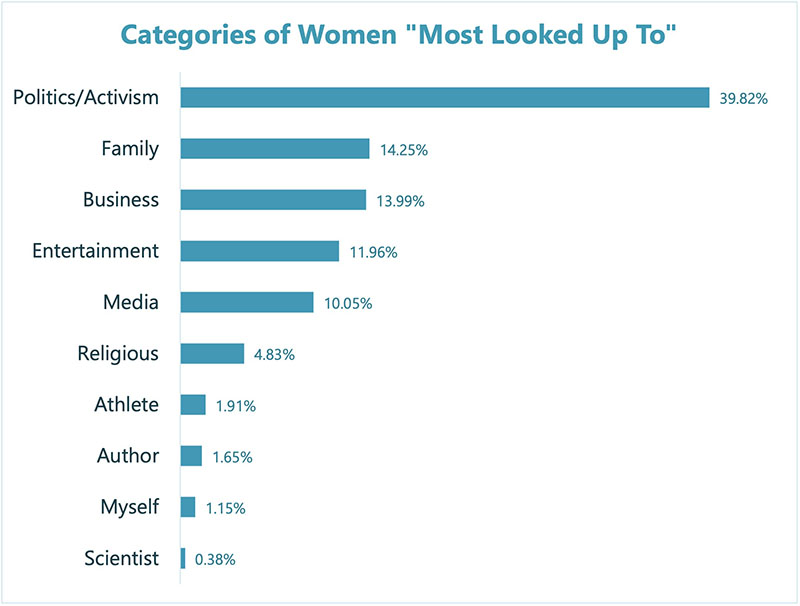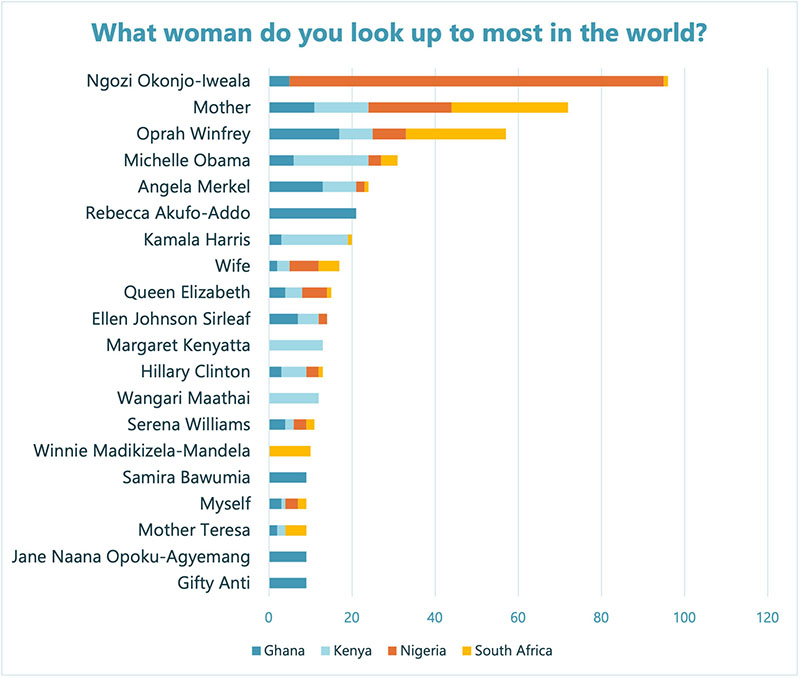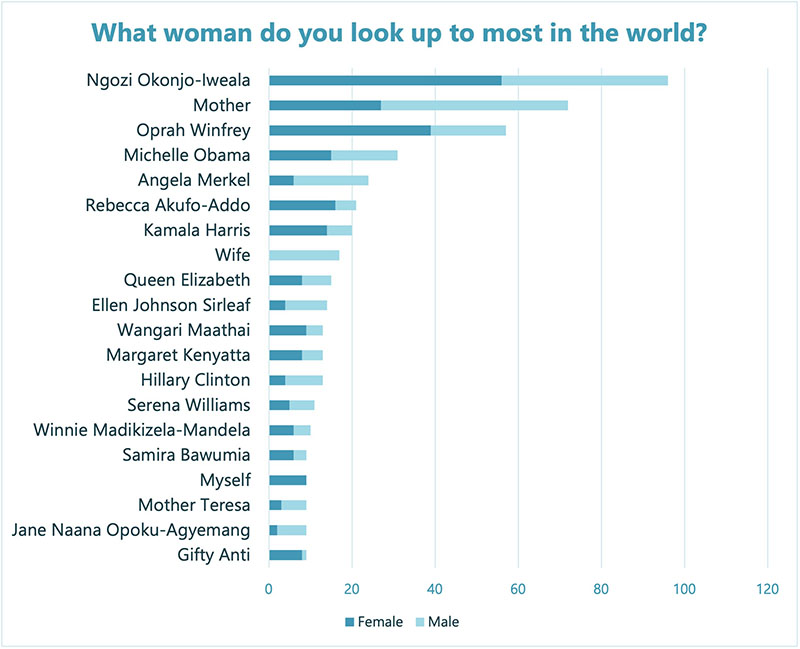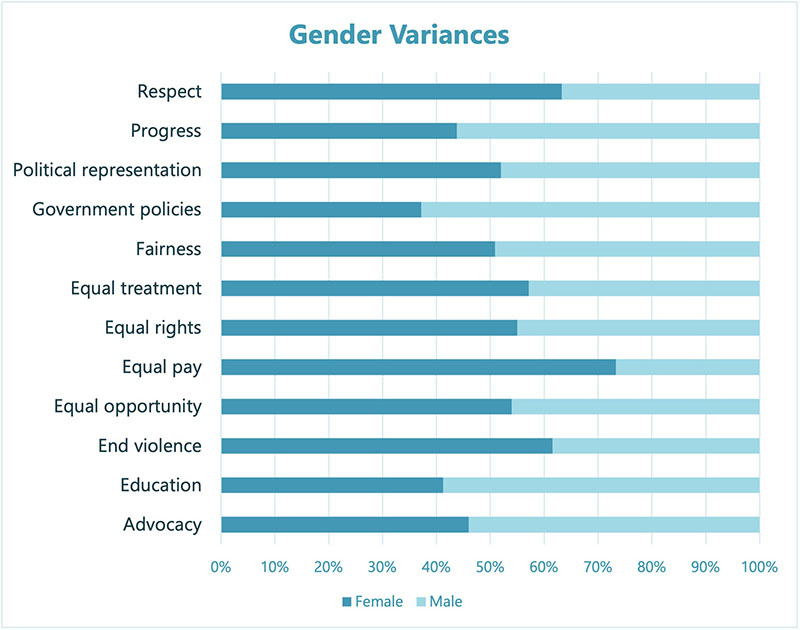- Contents
To mark International Women’s Day, GeoPoll conducted a study on gender equality in Ghana, Kenya, Nigeria, and South Africa in the first week of March 2021. The survey gathered responses from 400 respondents per market, for a total sample size of 1600. The gender distribution was 50% female and 50% male, and the sample was roughly nationally representative by age and gender. It was conducted through GeoPoll mobile web links, which generally reach a more affluent and educated population than other methodologies such as SMS or Computer Assisted Telephone Interviewing (CATI).
GeoPoll produced an initial summary of the research findings along with an interactive dashboard of the research data in early March. In this supplemental summary, we detail participants’ responses to two open-ended qualitative questions posed at the end of the survey. The questions include:
- What woman do you look up to most in the world?
- What are your hopes on gender equality in the future?
Most Admired Women
The first open-ended question in the survey asked, “What woman do you look up to most in the world?” Although respondents specified a wide variety and number of different women, for analysis purposes, they can be loosely sorted into the 10 categories listed in the chart below. The categories represent the professional field or personal relation of each woman mentioned.

Of the 786 respondents that answered this question with a specific person (either the name of a specific person or the title of a specific person, such as my mother, my sister, etc.), 40% report most looking up to a woman in politics or activism. That is more than twice as many as any other field. Twelve of the 20 women cited most frequently can be categorized as political figures and/or activists.
Family members came in a distant second, with 14% of respondents listing their mother, wife, grandmother, sister, daughter, or aunt as the woman they look up to most.
Women in business were also named 14% of the time, but in actuality, many of the women assigned to other categories, such as entertainment, media and politics, also own or run their own business or started their careers in the business world.
Most Frequently Named Women
The chart below displays the 20 women named most frequently in response to the open-ended survey question across countries and genders. The numbers in the chart indicate how many times each woman was named.

As the chart above displays, the woman respondents look up to most varies significantly by country. Some of the highlights include:
- Ngozi Okonjo-Iweala: Recognized as one of the great world leaders, Dr Ngozi Okonjo-Iweala is a Nigerian-American economist and international development expert who currently serves as Director-General of the World Trade Organization. Dr Okonjo-Iweala is especially revered in Nigeria, where 43% of respondents named her as the woman they look up to most. Of all the respondents that named her, 94% are from Nigeria.
- Mother: Across countries, men and woman frequently name their mother as the woman they look up to most. Men name their mother slightly more frequently than women (63% to 48%).
- Oprah Winfrey: The American media mogul and businesswoman is looked up to across genders and countries, but is particularly popular with women (68% of respondents that named her are women) and in South Africa (42% that named her are from South Africa).
- Michelle Obama: The wife of former US President and Kenyan-American Barack Obama, Michelle Obama is particularly popular in Kenya, as are other political figures Kamala Harris, Margaret Kenyatta, and Wangari Maathai.
- Rebecca Akufo-Addo: The current First Lady of Ghana, Rebecca Akufo-Addo, and Second Lady of Ghana, Samira Bawumia, both receive all their “most looked up to” votes from respondents in that country.
Despite the variances by country, the woman respondents look up to most remains fairly consistent across genders with a few exceptions. Of the top 3, Ngozi Okonjo-Iweala and Oprah Winfrey skew slightly female, while Mother skews slightly male.

Hopes for Gender Equality
GeoPoll’s International Women’s Day survey concluded by asking respondents, “What are your hopes on gender equality in the future?” In the process of analyzing and coding the more than 1,500 open-ended responses to the question, the following themes emerged:
- Advocacy: Hope that both men and women advocate for gender equality so that women are empowered and free to express themselves to increase awareness of the issue.
- Education: Hope that young women and men are taught (at home, school and in the community) about the need for and benefit of gender equality, and that schools provide equal educational opportunities for both boys and girls.
- End violence and harassment: Hope that all gender-based violence and harassment is stopped, that it is addressed legally, politically, and in schools, and that violators are prosecuted.
- Equal opportunity: Hope that women are provided the same opportunities to succeed as men, without discrimination, at school and in the workplace.
- Equal pay: Hope that women are paid the same amount as men for doing equal work.
- Equal rights: Hope that women are provided the same legal rights as men and receive equal justice under the law.
- Equal treatment: Hope that women are treated the same as men throughout society and the community.
- Fairness: Hope that women are treated fairly and without bias in all aspects of life.
- Government policies: Hope that the government will enact and enforce clear laws and policies to ensure gender equality.
- Political representation: Hope that women are encouraged to run for political office and promoted to other leadership positions to help drive the campaign for gender equality.
- Progress: A general hope or belief that the gender gap is starting to close, and generational changes will continue progress toward greater gender equality in the future.
- Respect: Hope that women are always treated with dignity and respect. Also that they are treated as equally important as men and equally recognized for their achievements and contributions.

All 12 themes emerged in each of the 4 countries included in the survey. The more general, overarching themes of equal treatment, equal opportunity and progress surfaced most frequently in response to the question (58% combined). To paraphrase, most respondents hope that progress will continue toward a world where women receive equal treatment and equal opportunity.
Hopes for Gender Equality by Gender

Men and women share many of the same hopes for gender equality in the future. In terms of variances, ending gender-based violence/harassment and attaining equal pay are more common hopes for women, while implementing government policies is a more common hope for men.
Gender Equality in Africa: An Interactive Data Dashboard
To dive deeper into GeoPoll’s data on gender equality, click here to access the interactive dashboard. The dashboard allows you to view all the data in the report, filterable by country, age group, gender and question.
Conduct Further Research with GeoPoll
GeoPoll conducts surveys globally through multiple mobile-based methods with the ability to remotely reach any population. GeoPoll conducts research to help brands, international development organizations, and governments better understand realities on the ground, even in the face of the challenges the world is undergoing. To request more information on our capabilities or get a quote for an upcoming project, please contact us.
